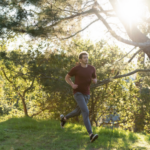How to avoid getting Respiratory Tract Infections (RTIs) and passing them on to others
RTIs can be spread from person to person through the coughs and sneezes of someone with an infection or through direct or indirect contact. 1,2
What causes RTIs?
If you have an RTI and are worried about spreading it to friends and family, or are worried about catching one, there are many simple actions you can adopt. 1,2,3
Actions to consider:
- Improve interpersonal hygiene
- Get vaccinated
- Quit smoking
- Live well by eating a balanced diet and getting exercise
![]() Each one of us can play a role in preventing the spread of infections.
Each one of us can play a role in preventing the spread of infections.
HYGIENE
Improving interpersonal hygiene is one of the best things to do to help avoid catching or passing on an RTI.
Here are 4 simple actions:
- COVER
- WASH
- THROW
- DON’T SHARE
![]() Let’s keep them in mind!
Let’s keep them in mind!

COVER your mouth when you cough or sneeze.
Small tip: Have disposable tissues easily accessible in your bag/pocket/car.

WASH your hands regularly or use hand sanitizer.
Small tip: Travel-size hand sanitizers are readily available and can be carried easily.

THROW away used tissues.
Small tip: Try to remember the maxim “Use once, throw away right away.”

DON’T SHARE cups, glasses, kitchen or eating utensils with others.
Small tip: Mark your cup with your name or other distinguishable element when you are at an event with a lot of people.
VACCINATION1,2,4

What is a Vaccine?
A vaccine is a product that stimulates your immune system to produce immunity to a specific disease, protecting you from that disease.4
Vaccines enhance our immune system to protect us against certain viruses. However, not all viruses can be vaccinated against. There are currently vaccines available for pneumonia and for the flu that can provide protection against these two respiratory tract infections.
Getting vaccinated is an effective way to reduce the risk of getting an RTI, especially if you are prone to recurrent RTIs or are at high risk of complications.
- Ask your GP about the annual flu vaccine
- Ask your GP if you should have the pneumococcal vaccine (this helps prevent pneumonia)
QUITTING SMOKING2
If you smoke, quitting is one of the best things you can do to prevent getting an RTI. It’s hard to give up,but smoking damages our lungs, meaning they can become infected more easily.
How to get started?
Initiatives may exist in your community to support you in quitting smoking. Don’t hesitate to speak to a doctor or pharmacist for help.
LIVING WELL
Living a healthy lifestyle has many benefits. To help ensure we are feeling our best and to reduce the risk of getting an RTI, consider the following suggestions:
Eat a balanced diet5
Eating a healthy, balanced diet is important to maintaining good health. This means eating a variety of foods in the right proportions and consuming the right amount of food and beverages to maintain a healthy weight.
Try to:
- Eat at least 5 servings of a variety of fruits and vegetables every day
- Base your meals on higher fiber, starchy foods such as potatoes, bread, rice or pasta
- Include some dairy products or dairy alternatives (such as soya or other plant-based products)
- Eat beans, fish, eggs, meat and other sources of protein
- Choose unsaturated oils and spreads, and eat them in small amounts
- Drink plenty of fluids
- Avoid regularly consuming foods and drinks that are high in fat, salt and sugar
How to get started?
If you think you may have an unbalanced diet, don’t hesitate to speak to a doctor or nutritionist/dietician for support.
Exercise6,7
Being physically active is one of the most important steps that we can take to improve our health and wellbeing at any age. Being physically active includes not only exercise but also cleaning the house, going to work on foot, taking the stairs, etc.
Physical activity is usually recommended every day. To guide you, the following are recommendations for every age group:
Guidelines for children and young people (aged 2 –18)
All children and young people should be active, at a moderate to vigorous level, for at least 60 minutes every day. This includes muscle strengthening (such as cycling, dancing, hill walking, working with resistance bands, etc.), flexibility (such as rolls, sideway bends, etc.) and bone-strengthening exercises (such as jumping jacks, running, brisk walking, and weight-lifting exercises, etc.) 3 times a week.
Guidelines for adults (aged 18–64)
At least 30 minutes a day of moderate-intensity activity, 5 days a week (or 150 minutes a week).
Guidelines for older people (aged 65+)
At least 30 minutes a day of moderate-intensity activity, 5 days a week (or 150 minutes a week). Focus on aerobic activity, muscle strengthening and balance.
Guidelines for children and adults with a disability
Aim to be as active as the disability allows to meet the guidelines for your age group.
How to get started?
Small tip: Try to find an activity that you really enjoy and don’t hesitate to be active in groups to motivate each other.
Physical activity is a benefit for everyone, and any level of activity is better for our health than none.
Consult with you doctor or physical trainer to find out what physical activity and level of intensity are the best for you.












